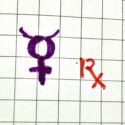- More on that MRX

More on that MRX
- Mercury hits 20° Scorpio 10/20.
- Mercury bounces at 6° Sagittarius 11/7-13, turning officially retrograde on 11/10.
- Mercury slides back to 20° Scorpio 11/27-12/1, direct on 12/1
- Mercury reaches 6° Sagittarius again on 12/17.
More on that MRX
 Sagittarius is mutable fire sign. Maybe not the best fire, that’s usually Leo, but we are companionable. Recent eclipse action, Virgo/Pisces then Virgo/Virgo (opposite Saturn/Neptune)? That paved the way for some new deconstruction, reconstruction. That’s what this is about as Retrograde Mercury dips from fiery Sagittarius back into watery Scorpio, then forward again, culminating at almost the same time as the Sun crosses into Capricorn, the Winter Solstice.
Sagittarius is mutable fire sign. Maybe not the best fire, that’s usually Leo, but we are companionable. Recent eclipse action, Virgo/Pisces then Virgo/Virgo (opposite Saturn/Neptune)? That paved the way for some new deconstruction, reconstruction. That’s what this is about as Retrograde Mercury dips from fiery Sagittarius back into watery Scorpio, then forward again, culminating at almost the same time as the Sun crosses into Capricorn, the Winter Solstice.
Back in the bad, old days, I used a product as a gasket sealer, called — don’t know the name. It was yellow, branded with a Yamaha tube, nasty kind of glue that withstood engine heats. Used it on European motorcycles because it worked better than anything else. It was nasty stuff. Sickly yellow color. Probably no longer available, and possibly poisonous. But it worked, back then. Tear a motor down to pieces, then gradually reassemble it, and use that yellow Yamaha-brand gasket-sealer as part of the process.
We all need some possibly hazardous “gorilla snot” help glue this together — after Mercury goes direct and gets back to its starting point.More on that MRX
Sun into Scorpio 10/23 4:38 AM Mars into Sagittarius 11/4 7:01 AM Venus into Scorpio 11/6 4:39 PM Sun into Sagittarius 11/22 1:32 AM Venus into Sagittarius 11/30 2:14 PM Solstice — Sun into Capricorn — is 12/21 at 9:03 AM local.the Portable Mercury Retrograde
 Please support public libraries.
#shakespeare
#horoscope
Please support public libraries.
#shakespeare
#horoscope
The weekly news: delivered!


